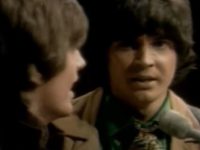Bursting forth as rock teetered between too-big prog pyrotechnics and mawkishly symphonic concept records, it comes as little surprise that Big Star seemed to disappear with barely a ripple.
That, and the fact that Alex Chilton, who died yesterday at 59 after a heart attack, always seemed to be disappearing, anyway.
Even so, Chilton, along with early bandmate Chris Bell, eventually found a place in music history through those who fell under the spell of Big Star’s happily unfocused influence. Both 1974’s “Radio City” and Big Star’s ironically titled debut “#1 Record,” issued by Ardent in 1972 — and home to a favorite track called “September Gurls” — provided the stones and cement in the foundation of 1980s college rock.
Among those who draw a line straight back to Chilton and this band are R.E.M., the Replacements, the dBs, the Posies, Teenage Fanclub, this Mortal Coil and the Bangles (who covered this song), among many others. Bits and pieces of all those groups are found throughout Big Star’s short-lived, early 1970s outburst — and in today’s offbeat power-pop offerings from, say, Fountains of Wayne and Weezer.
Chilton, who had an unforgettable early hit as a teenager with “The Letter” before storming out of the Box Tops, brought both a gravel-gargling voice and this lingering passion for American soul music to the proceedings. That was, at least initially, counterbalanced by Bell — who had immersed himself in a more muscular British rock sound. The pair collaborated, briefly, at Ardent Studios — where Bell worked as a sessions guitarist and aspiring engineer. Two members of Bell’s working band Ice Water (bassist Andy Hummel and drummer Jody Stephens) completed the early lineup of Big Star, named in another stroke of lazy brilliance for the supermarket across the street from Ardent in Memphis.
Together, Big Star created what must be music’s first punk love song, “The Ballad of El Goodo,” memorably diffident rockers in “Feel” and “Life is White” that deep-fried the cold toughness of big-city coolsters like Lou Reed, guitar-pop gems including “Back of a Car,” and a quiet little tune about adolescent yearning called “Thirteen” that somehow crawled out of obscurity into Rolling Stone magazine’s list of the 500 best rock songs of all time — at No. 396, right between “Remember (Walkin’ in the Sand)” by the Shangri-Las and “(Don’t Fear) the Reaper” by Blue Oyster Cult.
Too bad nobody much cared.
A combination of general commercial indifference, in-fighting within the band as Chilton exerted his own frustratingly mercurial influence, and poor distribution through the faltering local Stax label stopped Big Star before it could do much more than these two albums. Yet, we are left with moments of shimmering, frail beauty like “September Gurls,” a pub-rock crooner that crackles with Southern soul. It didn’t sound like anything else back then.
Ten years later, of course, it sounded like everything. By then, Chilton became a kind of arrived-too-soon touchstone for the blossoming alternative rock culture. The Replacements — a band that perhaps perfectly echoed both Chilton’s utterly believable vulnerability and his boozy unpredictability — copped to it in their 1987 tribute “Alex Chilton.”
He couldn’t have cared less, it seemed. Maybe that was his defense mechanism, a way to fight off the fame he didn’t want. Either way, Chilton dashed off again, putting out only occasional tossed-together projects with odd names including “Like Flies On Sherbert.” He was, at one point, said to be washing dishes in New Orleans, blissfully unaware of his own legacy. He’d put out a record called “Lost Decade” — and mean it.
Eventually, Chilton reformed Big Star, with Stephens and members of the Posies, and they continued to play sporadically (a show was scheduled for Saturday, in fact, at Austin’s SXSW festival). “In the Street,” from #1 Record,” became the theme song to TV’s “That ’70s Show.” A new Big Star release arrived in 2005 with “In Space,” the first since a pieced-together collection of studio odds-and-ends called “Big Star’s 3rd.” “I’m In Love With A Girl” showed up in last year’s film “Adventureland.”
Nothing captured the strange magic of those first two albums in general, and this tune in particular. There is both a quiet delicacy and a scuffed-up edge to “September Gurls,” in keeping with everything we thought we knew about Alex Chilton.
Which wasn’t much.
Rarely interviewed, he never went into detail about this time, or about these songs. That only added to Chilton’s myth — and, in the end, actually makes his own passing easier to accept. In many ways, Alex Chilton has been gone for a while.
- How Deep Cuts on ‘Music From Big Pink’ Underscore the Band’s Triumph - July 31, 2023
- How ‘Islands’ Signaled the Sad End of the Band’s Five-Man Edition - March 15, 2022
- The Band’s ‘Christmas Must Be Tonight’ Remains an Unjustly Overlooked Holiday Classic - December 25, 2016



